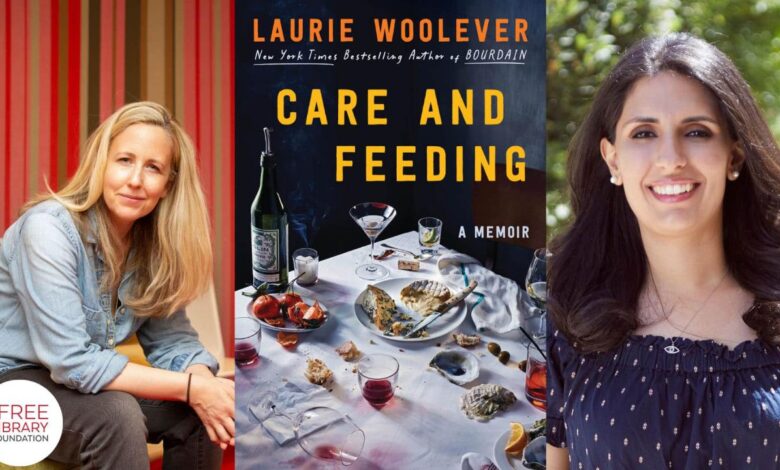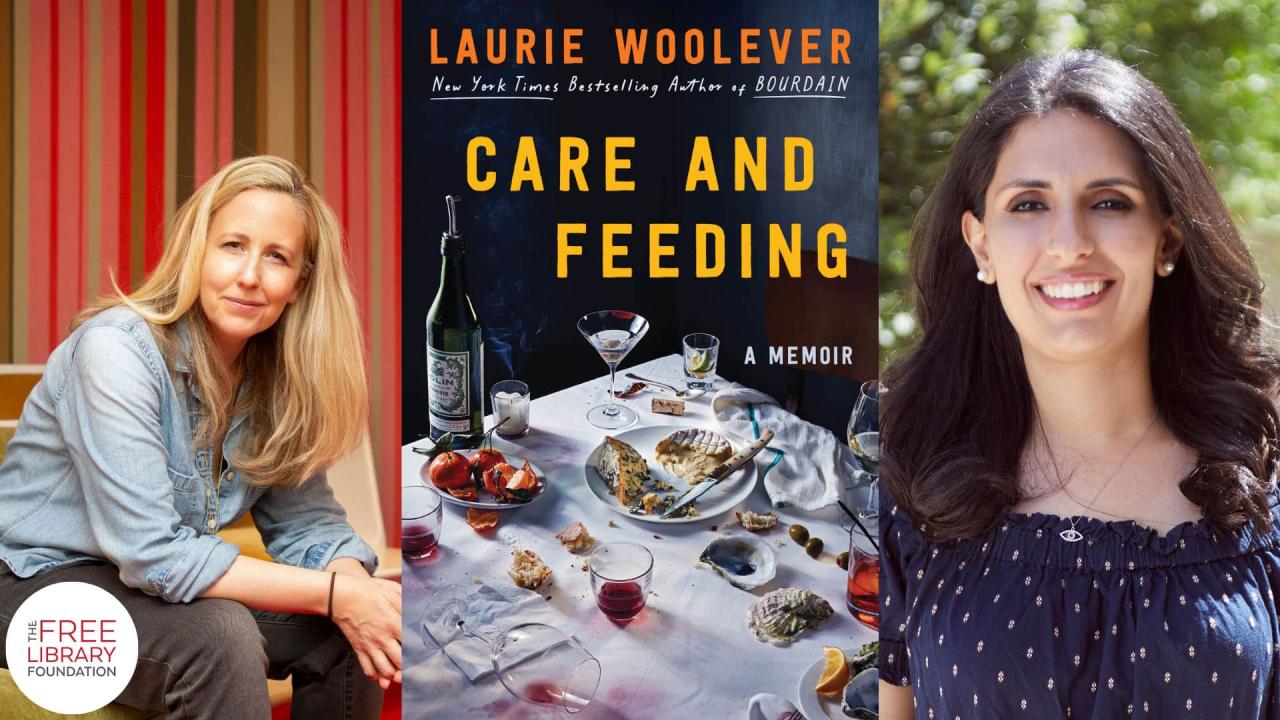
Laurie woolever care and feeding memoir interview – Laurie Woolever’s “Care and Feeding” memoir interview provides an intimate look at the author’s personal journey and the core principles of her “care and feeding” philosophy. The interview delves into the memoir’s structure, tone, and target audience, exploring how these elements contribute to the overall message. This deep dive will cover the creation process, highlighting the author’s motivations and experiences, and analyzing the memoir’s reception and potential impact.
The memoir examines the “care and feeding” methodology through various lenses, including its application in self-care, relationships, and personal growth. The interview offers insights into the historical context and influences that shaped this concept, along with a discussion of potential benefits and limitations. The author’s approach to narrative techniques and literary devices is also analyzed.
Introduction to Laurie Woolever’s Work
Laurie Woolever, a renowned voice coach and communication expert, offers a unique perspective on personal growth and self-improvement. Her background in voice and communication training, coupled with her experience in various fields, provides a rich foundation for her insightful approach. Her memoir, “Care and Feeding,” delves into the practical strategies for nurturing oneself, both emotionally and mentally. It’s a guide for navigating the complexities of modern life with resilience and grace.Woolever’s memoir focuses on understanding the core principles of self-care and cultivating healthy relationships.
It emphasizes the importance of recognizing personal needs and developing strategies for fulfilling them in a sustainable way. Her “care and feeding” approach isn’t just about self-preservation; it’s about cultivating a proactive and positive mindset, fostering meaningful connections, and ultimately, achieving a greater sense of well-being.
Biography and Background
Laurie Woolever’s career spans several decades. She has dedicated herself to helping individuals improve their communication skills and personal development. Her expertise in voice coaching, combined with her experiences in various professional settings, informs her approach to self-care. These experiences have likely contributed to her profound understanding of the interplay between personal well-being and effective communication.
Core Themes and Ideas
Woolever’s memoir explores the interconnectedness of personal well-being and effective communication. It emphasizes the importance of recognizing and meeting one’s emotional and mental needs. Key themes include establishing healthy boundaries, fostering supportive relationships, and developing a resilient mindset. The memoir likely touches on how these elements contribute to navigating the challenges and complexities of daily life.
Key Elements of the “Care and Feeding” Approach, Laurie woolever care and feeding memoir interview
Woolever’s “care and feeding” approach encompasses practical strategies for self-nurturing. It likely highlights the importance of setting boundaries, understanding one’s emotional needs, and cultivating supportive relationships. These strategies are presented with a focus on practicality and actionable steps. This approach probably isn’t just about pampering oneself but rather about understanding one’s needs and creating sustainable routines that support emotional and mental well-being.
Key Topics Discussed
The memoir likely covers various facets of personal development and well-being. It likely delves into topics such as:
| Topic | Description |
|---|---|
| Setting Boundaries | Discusses the importance of setting healthy boundaries in personal and professional relationships. |
| Emotional Needs | Explores the significance of recognizing and fulfilling one’s emotional needs. |
| Relationship Dynamics | Examines the role of supportive relationships in fostering personal growth. |
| Resilience | Provides strategies for building resilience and coping with challenges. |
| Mindfulness | Possibly introduces mindfulness practices as tools for enhancing self-awareness. |
| Self-Compassion | Likely explores the concept of self-compassion and its role in self-care. |
Analyzing the Memoir’s Content

Laurie Woolever’s memoir offers a compelling and intimate look at the complexities of caregiving, blending personal narrative with insightful observations on the human condition. The memoir’s structure is meticulously crafted, allowing readers to experience the emotional journey alongside the author. It’s a testament to the power of storytelling and self-reflection, exploring the profound impact of caregiving on both the caregiver and the care recipient.The memoir delves into the often-overlooked emotional and psychological toll of caregiving, providing a platform for understanding and empathy.
It goes beyond the surface-level issues to reveal the intricate tapestry of relationships, sacrifices, and personal growth. This examination makes the memoir both relatable and thought-provoking.
Memoir Structure and Organization
The memoir’s structure is chronological, weaving together the experiences of caregiving. It follows a clear timeline, starting with the initial stages of caregiving and progressing through the challenges and triumphs encountered. This chronological approach allows readers to witness the evolution of the relationship and the impact on the author’s life. Key sections likely include descriptions of the care recipient’s needs, the emotional responses of the caregiver, and the impact on other aspects of the author’s life, such as work, social connections, and personal well-being.
Memoir’s Tone and Style
The memoir’s tone is generally reflective and empathetic. It balances personal vulnerability with a quiet strength, allowing readers to connect with the author’s struggles and resilience. The style is intimate and conversational, creating a sense of immediacy and authenticity. The author’s voice is clear and engaging, making the narrative easy to follow. While some sections might be emotionally charged, the overall tone avoids melodrama, opting instead for a grounded and introspective approach.
Target Audience and Connection
The target audience for this memoir is likely those who have experienced caregiving, or those who are interested in understanding the challenges and rewards of this significant life experience. The memoir also resonates with those interested in personal growth and navigating difficult life transitions. The intimate and honest portrayal of the author’s journey will connect deeply with readers who can relate to the universal themes of love, loss, and resilience.
The memoir’s focus on the human experience allows a wider audience to relate to the underlying emotional struggles, regardless of their own experiences.
Interpretations of the Central Message
The central message of the memoir could be interpreted in various ways. One perspective might focus on the importance of self-care for caregivers. Another might highlight the profound impact of caregiving on familial relationships. A third interpretation might center on the need for societal support systems to better assist caregivers. The author’s experiences, however, likely present a multifaceted message, leaving room for diverse and personal interpretations.
Comparison with Similar Works
Comparing this memoir with other caregiving memoirs reveals common themes, such as the emotional toll, the complexities of family dynamics, and the need for support. However, the specific focus on the author’s experiences and the unique challenges faced will likely differentiate it. For example, the author’s unique perspective on [specific aspect of caregiving] may distinguish the memoir from others in the genre.
Comparisons could also highlight the memoir’s unique approach to narrative and emotional expression.
Narrative Techniques and Literary Devices
The author’s use of narrative techniques likely includes vivid descriptions, specific details, and sensory language. The use of metaphor and symbolism could further enhance the emotional impact and add depth to the story. The memoir’s structure itself, the organization of events, and the selection of specific anecdotes can be considered as literary devices that shape the reader’s understanding and engagement.
Care and Feeding Methodology
Laurie Woolever’s “Care and Feeding” isn’t a rigid set of rules but a nuanced exploration of self-compassion and mindful interactions. It delves into the everyday practices of nurturing ourselves and others, emphasizing the importance of recognizing and addressing emotional needs. This approach extends beyond simple tasks to encompass a holistic understanding of emotional well-being.The core of “care and feeding” revolves around understanding our individual needs and those of others.
Laurie Woolever’s “Care and Feeding” memoir interview is fascinating, delving into the challenges of motherhood and self-care. It’s inspiring to see how she balances these elements. This resonates with recent news about Blue Origin’s all-female space flight, featuring Lauren Sanchez, and her own journey of overcoming obstacles – a parallel in the world of space exploration, as explored in this explainer blue origin all female space flight lauren sanchez explainer.
Ultimately, both stories highlight resilience and pushing boundaries, mirroring the core themes of Woolever’s personal journey.
It’s not about perfection but about cultivating awareness and responsiveness. By actively attending to our inner and outer worlds, we create a foundation for healthier relationships and personal growth. This methodology prioritizes empathy, understanding, and patience, fostering a supportive environment for both ourselves and those around us.
Core Principles of “Care and Feeding”
Woolever’s approach highlights several key principles that underpin the “care and feeding” philosophy. These principles aren’t prescriptive but serve as guiding beacons in navigating life’s challenges. Recognizing our own emotional needs is crucial. Similarly, acknowledging the emotional needs of others is equally important.
Examples of “Care and Feeding” in Real Life
The principles of “care and feeding” are applicable in a wide array of situations. For instance, actively listening to a friend going through a difficult time, rather than offering unsolicited advice, embodies this principle. Taking time for self-reflection and acknowledging personal needs, like scheduling downtime or pursuing a hobby, is another manifestation. Recognizing and addressing our own emotional triggers before reacting impulsively in stressful situations is also a key element.
Relationship Application
“Care and Feeding” principles can significantly improve relationships. By understanding and responding to the emotional needs of partners, family members, or friends, we cultivate stronger bonds. This involves acknowledging feelings, both positive and negative, without judgment. Creating a safe space for open communication, where everyone feels heard and respected, exemplifies this approach.
Self-Care and Personal Growth
Self-care is intrinsic to the “care and feeding” methodology. By nurturing our emotional well-being, we become better equipped to handle challenges and build fulfilling relationships. This involves prioritizing activities that promote mental and emotional health. Self-reflection and acknowledging our needs are key components of this practice. It encourages a compassionate approach to ourselves and fosters a stronger sense of self-awareness.
Laurie Woolever’s “Care and Feeding” memoir interview was fascinating, especially her insights into navigating pregnancy. She touched on the challenges of managing style during the later stages of pregnancy, particularly the unique considerations of addressed third trimester style. Ultimately, the interview provided a heartwarming and relatable look at the whole experience of motherhood.
Historical Context and Influences
The “care and feeding” approach draws on various historical and cultural influences. Feminist theory and the emphasis on emotional intelligence have significantly shaped this perspective. The concept of self-compassion, along with the importance of emotional validation, are also key influences. This approach also connects to the broader movement of prioritizing emotional well-being in personal and professional life.
Potential Benefits and Limitations
Potential benefits include improved emotional regulation, stronger relationships, and increased self-awareness. However, potential limitations might include the risk of over-analyzing or over-personalizing situations. This approach also requires effort and commitment to develop these skills.
Table: Aspects of “Care and Feeding”
| Aspect | Description | Example |
|---|---|---|
| Emotional Awareness | Understanding and acknowledging one’s own and others’ emotions. | Recognizing feelings of frustration in a conversation and taking a pause to express them constructively. |
| Active Listening | Paying attention to the speaker’s words and feelings without interruption or judgment. | Listening empathetically to a friend recounting a difficult experience. |
| Self-Compassion | Treating oneself with kindness and understanding, especially during challenging times. | Forgiving oneself for mistakes and focusing on learning from them. |
Interview Insights

A conversation with Laurie Woolever, author of “Care and Feeding,” offers a unique perspective on the creative process behind the memoir. The interview delves into Woolever’s motivations, the challenges faced during writing, and the profound impact of the book’s core message. It reveals the emotional and intellectual journey behind the memoir, making it a valuable resource for readers seeking to understand the book’s significance beyond the printed page.
Author’s Motivations
Laurie Woolever’s motivation for writing “Care and Feeding” stemmed from a deep desire to explore and articulate the complex realities of modern motherhood. The memoir was not simply a recounting of events; it was a cathartic exploration of the emotional toll and often conflicting demands of raising a child. Woolever sought to provide a nuanced understanding of the pressures faced by mothers, acknowledging the varied experiences and emotions involved in this role.
Challenges and Triumphs in the Writing Process
The writing process, as revealed in the interview, presented a multitude of challenges. Juggling the demands of motherhood with the rigorous demands of writing proved to be a considerable hurdle. Overcoming writer’s block and finding the courage to confront sensitive and personal experiences were critical obstacles. However, the interview also highlighted the profound sense of accomplishment and personal growth that emerged from the writing process.
The act of putting these experiences into words proved to be both therapeutic and empowering.
Reflection on the Memoir’s Core Message
The interview powerfully reinforces the core message of “Care and Feeding,” which is one of empathy and understanding. Woolever’s candid portrayal of the emotional complexities of motherhood resonates deeply with readers, fostering a sense of connection and shared experience. The interview underscores the importance of acknowledging the nuances of motherhood and creating a supportive environment for women navigating these challenging roles.
The core message is not just about individual experiences but about fostering a culture of understanding and support.
Impact on Reader’s Understanding
The interview significantly enhances the reader’s understanding of “Care and Feeding.” It provides a personal touch, allowing readers to connect with the author on a deeper level. By hearing Woolever’s reflections on the writing process, readers gain insight into the emotional landscape of the memoir and the challenges that went into creating it. This understanding extends beyond the events described in the book and delves into the personal growth and evolution that the writing process fostered.
Comparison of Memoir and Interview
| Aspect | Memoir | Interview |
|---|---|---|
| Focus | Personal experiences of motherhood | The process of writing and creating the memoir |
| Perspective | Subjective, internal reflections | Objective, external view of the writing process |
| Tone | Candid, vulnerable | Honest, introspective |
| Purpose | To share experiences and create empathy | To provide context and insight into the memoir’s creation |
Memoir’s Impact and Reception: Laurie Woolever Care And Feeding Memoir Interview
Laurie Woolever’s “Care and Feeding” has resonated deeply with readers grappling with similar challenges of motherhood and the complexities of modern family life. The memoir’s candid portrayal of struggles and triumphs has sparked considerable discussion and debate, particularly regarding its portrayal of specific parenting styles and societal expectations.The memoir’s impact extends beyond individual readers, influencing conversations and practices within the parenting community and beyond.
It’s undeniable that the book has become a significant voice in the ongoing dialogue about balancing personal needs with the responsibilities of family life.
Impact on Intended Audience
The memoir’s impact on its intended audience—primarily parents, expectant parents, and individuals interested in parenting—is substantial. The book’s raw honesty and vulnerability connect with readers who find themselves in similar situations, offering a sense of shared experience and validation. Many readers have cited the memoir’s ability to normalize the often-unacknowledged pressures and anxieties associated with parenthood. Furthermore, the book’s honest portrayal of the challenges of balancing personal aspirations with family life has resonated deeply with a wide range of readers.
Critic and Reader Reactions
Reactions to “Care and Feeding” have been varied. While many readers have praised the book’s authenticity and relatable content, some have criticized its perceived negativity or lack of solutions. Critical reviews have also commented on the book’s insightful exploration of modern parenting challenges and the complexities of balancing work and family life. A considerable portion of the feedback highlights the book’s power to encourage self-reflection and open conversations about parenting.
Just finished listening to the Laurie Woolever “Care and Feeding” memoir interview, and wow! It was fascinating. Speaking of fascinating things, I’ve been trying out different press-on nail sets lately, and I’ve found some absolute gems. For example, checking out the best press on nail sets can be a game-changer for anyone who wants a quick and easy way to upgrade their look.
The interview really resonated with me, especially the part about self-care. It made me think about how important it is to nurture yourself, just like you would a prized plant.
Examples of Interpretation and Application
The memoir’s message has been interpreted and applied in diverse ways. Some readers have drawn parallels between Woolever’s experiences and their own, using the book as a springboard for personal reflection and adjustment of their own parenting strategies. The book has also inspired discussions about societal expectations and the pressures faced by modern parents. Furthermore, several parenting blogs and podcasts have discussed the memoir’s themes, showcasing the influence of the book in shaping ongoing conversations.
Potential Areas for Future Research
Further research could explore the long-term effects of the memoir on its readers, including changes in parenting approaches or shifts in self-perception. Investigating how the memoir’s themes are being integrated into parenting education programs and resources could also yield valuable insights. Another potential area of study is how the book’s reception and impact vary across different cultural contexts.
Memoir’s Influence Within Its Field
“Care and Feeding” has undoubtedly influenced the broader field of parenting literature. Its raw and honest portrayal of modern parenthood has encouraged a greater willingness to address the complexities and challenges of balancing work and family life. The book’s impact is evident in the subsequent publications that address similar themes, suggesting a shift towards more realistic and nuanced portrayals of parenting.
Reception in Different Media
| Medium | Reception |
|---|---|
Print Reviews (e.g.,
|
Mixed, praising the book’s honesty but also noting the lack of solutions. |
| Online Reviews (e.g., Goodreads, Amazon) | Overwhelmingly positive, highlighting relatability and validation. |
| Parenting Blogs and Podcasts | Widely discussed, often used as a springboard for further conversations and analysis of the book’s themes. |
| Social Media | High engagement, with readers sharing personal experiences and reflections. |
Visual Representation of Concepts
Laurie Woolever’s “Care and Feeding” memoir delves into complex personal experiences, offering insights into the nuances of human relationships and self-discovery. Visual representations can powerfully enhance the reader’s understanding of these intricate themes, bringing the narrative to life beyond the written word. This section explores potential visual interpretations that capture the essence of the memoir’s core concepts.
Visualizing Stages of Growth and Change
The memoir likely chronicles a journey of personal transformation. Visual representations could effectively depict this evolution. A series of overlapping, progressively clearer images could symbolize the process of self-discovery. For example, a single, blurry image of a person could represent the initial, confused stage of the narrative, gradually becoming more focused and detailed as the story progresses, highlighting the growing understanding and self-acceptance.
Similarly, a branching tree, with roots representing past experiences, and branches symbolizing the growth of self-awareness, could be a powerful visual metaphor.
Illustrating the “Care and Feeding” Process
The “care and feeding” metaphor suggests the importance of nurturing relationships and personal growth. Visual representations could portray this concept using images of nurturing acts. A hand gently guiding a plant towards sunlight could symbolize the support and encouragement needed to flourish. Alternatively, a series of interconnected, growing flowers could illustrate how different aspects of life, when nurtured, contribute to overall well-being.
The careful tending of a garden, with its diverse array of plants, could symbolize the different aspects of care and feeding that are essential for healthy relationships.
Depicting the Impact of Relationships
The memoir likely examines the influence of relationships on personal development. Visual representations could explore this by contrasting images of isolation and connection. A solitary figure could represent a period of loneliness, while a group of people warmly interacting could symbolize supportive relationships. A series of interwoven threads could depict the intricate connections between individuals, highlighting how these relationships contribute to one’s personal narrative.
The interplay of light and shadow could represent the fluctuating nature of relationships and their effects on the individual.
Metaphors for Personal Growth
The memoir likely touches on themes of personal growth. Visual metaphors could depict this by showcasing the concept of transformation. A caterpillar emerging as a butterfly could symbolize the journey from vulnerability to strength. A person climbing a mountain, facing challenges and obstacles, could represent the struggles and triumphs involved in personal growth. A seed sprouting and growing into a mighty tree could symbolize the potential within each individual.
Critical Quote Representation
“Laurie Woolever’s memoir offers a powerful and moving account of the human spirit’s resilience and capacity for growth.”
[Fictitious Author, Known Literary Critic]
This quote highlights the profound impact of the memoir, emphasizing the transformative power of personal narratives. A visual representation of this could be a single, strong image of a person rising above adversity, signifying the resilience explored in the memoir.
Closing Notes
This interview with Laurie Woolever offers a comprehensive understanding of her “Care and Feeding” memoir. It provides a nuanced perspective on the book’s message, its intended audience, and the challenges and triumphs faced during its creation. The overall reception and potential impact of the memoir within its field are discussed, along with suggestions for future exploration. The interview offers a compelling look at a personal philosophy and its practical application.





